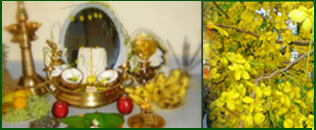Vishu is celebrated on the first day of the Malayalam month 'Medam'. The festival is marked with offerings to the divine called 'Vishukkani'. The offerings consist of a ritual arrangement in the puja room of auspicious articles like raw rice, fresh linen, golden cucumber, betel leaves, arecanut, metal mirror , the yellow flowers 'konna', a holy text and coins in a metal vessel called 'uruli'.
A nilavilakku is also placed alongside. These arrangements are completed the previous night.
|
|
tIcfobmtLmj§fnð {]m[m\yaÀln¡p óXmWv hnjp. taSamk¯nse kw{IaZn\¯nemWv hnjp. {]mNo\ ImeKW\ A\pkcn¨v Cu Zn\¯nembncpóp
]pXphÀj¸ndhn.
. Ató Znhkw ImWpó IWnbpw AXnsâ \ñ A\p`h§fpw Bïpapgph³ \ne\nð¡pw Fó hnizmk¯nemWv IWnImWð NS§v \nÀhln¡póXv.
|
On the day of Vishu, the custom is to wake up at dawn and go to the puja room with the eyes closed so that the vishukkani is the first sight of the new season.
Vishu is celebrated with more vigour in North Kerala. Bursting crackers is part of the celebration. The elders of the family distribute tokens of money called 'Vishukkaineettam' to the children, servants and tenants.
|
|
 |
| |
|
Ató Znhkw ImWpó IWnbpw AXnsâ \ñ A\p`h§fpw Bïpapgph³ \ne\nð¡pw Fó hnizmk¯nemWv IWnImWð NS§v \nÀhln¡póXv.
hnjphnsâ XteómÄ cm{Xnbnð Krl\mbnI IWnsbmcp¡póp.
henb Hm«pcpfnbnð IWns¡mó¸qhv, [m\y§Ä, ^ehÀ¤§Ä, \mfntIcw Fónh \nc¯n hbv¡póp. Dcpfn¡p sXm«p]nónð {ioIrjvWhn{Klw {]XnjvTn¨v AXnð kzÀ®amebpan«v hmð¡®mSnbpw hbv¡póp.
|